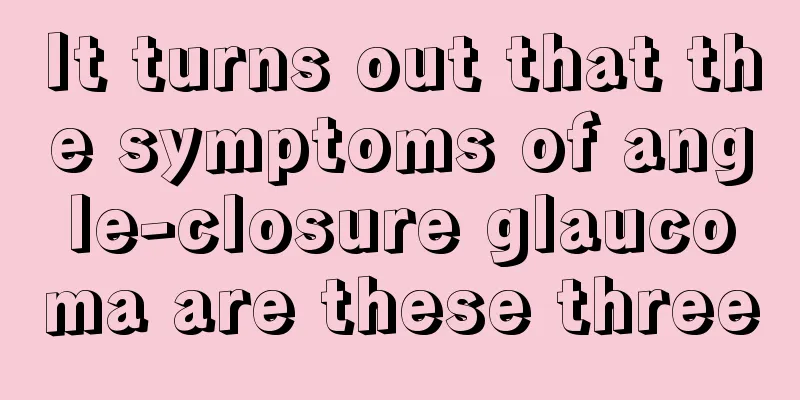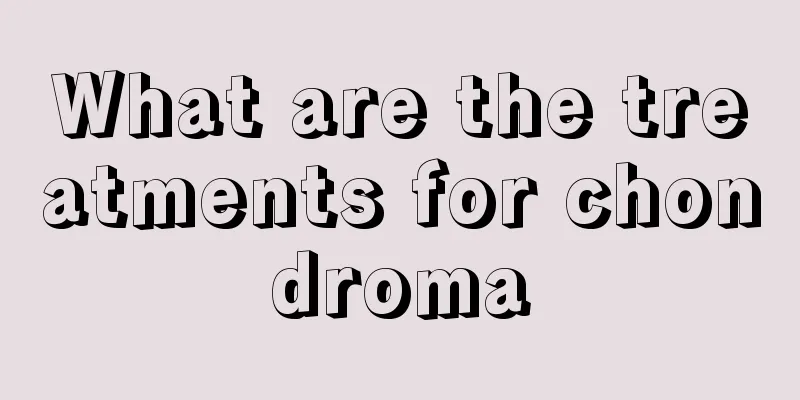It turns out that the symptoms of angle-closure glaucoma are these three

|
Angle-closure glaucoma is a common type of glaucoma in life, which is very harmful to people's eye health. Therefore, it is particularly important to understand the symptoms of angle-closure glaucoma and treat it in time. In fact, the symptoms of angle-closure glaucoma vary depending on the stage of the disease. In the early stage of the disease, one eye has developed acute angle-closure glaucoma, while the other eye has a shallow anterior chamber and a narrow angle, but normal intraocular pressure and no subjective symptoms. 1. Early stage of angle-closure glaucoma: One eye has developed acute angle-closure glaucoma, and the other eye has a shallow anterior chamber and a narrow angle, but normal intraocular pressure and no subjective symptoms. It is in the preclinical stage. 2. Prodromal period of angle-closure glaucoma: Before an acute attack, patients often experience mild headaches, eye swelling, nausea, blurred vision, and temporary iridescence due to emotional fluctuations, mental or physical fatigue, reading for too long, or watching TV or movies. These symptoms will resolve on their own after rest, which is called the prodromal period. Such minor attacks became more and more frequent, and finally turned into an acute major attack. 3. Acute attack of angle-closure glaucoma (1) Because of the sudden increase in intraocular pressure, the patient suddenly feels severe eye pain and headache. Significant decrease in visual acuity, only the anterior index, light perception or no light perception. Due to the vagus nerve reflex, it may be accompanied by nausea and vomiting, and may be easily misdiagnosed as acute gastroenteritis or intracranial disease. A detailed medical history and examination should be conducted to identify the disease. (2) Mixed congestion is obvious, accompanied by congestion and dilation of the conjunctival surface blood vessels, and sometimes mild eyelid and conjunctival edema. (3) Corneal edema, foggy and turbid appearance, sometimes blisters form on the epithelium, sensation is reduced or absent, and there may be pigmentation behind the cornea. (4) The anterior chamber is very shallow and the anterior chamber angle is occluded. Cytochrome particles can be seen floating in the aqueous humor, and even fibrinous exudates. (5) The pupil is dilated, elliptical in shape, and no longer responds to light. This is due to paralysis of the nerve that controls the pupillary dilator muscle. Because of the edema of the refractive media, the pupil takes on a bluish-green color, hence the name glaucoma or glaucoma. The above are the symptoms of angle-closure glaucoma. Do you understand? If you accidentally experience the above symptoms, you must seek treatment in time to avoid serious consequences. |
<<: There are white spots on my arms, what's going on?
Recommend
Is small cell lung cancer dangerous?
There are two types of lung cancer: small cell lu...
What are the symptoms of splenomegaly
The spleen and stomach are both important organs ...
Being lazy at this time can lead to four serious illnesses
1. Bladder cancer caused by not being able to go ...
Is drinking alcohol harmful to health?
Alcohol can cause great damage to human health, s...
Does white sugar increase or decrease internal heat?
In life, many people like to eat sweets very much...
How to peel grapes
Grapes are a very delicious fruit in our life. Th...
What do I need to bring to the beach?
As the pace of life becomes faster and faster, ma...
Can burn blisters be popped?
Scalding by water is a common symptom in life. Bl...
Will early stage kidney cancer metastasize?
Will early-stage kidney cancer metastasize? Kidne...
How long does it take for scraping to be effective for weight loss
As a new way of health preservation, scraping has...
How to regulate kidney yin deficiency?
Kidney Yin deficiency is a problem that many peop...
August seasonal vegetables
Vegetables are indispensable ingredients in our l...
What are the materials of removable dentures
Dental problems are a common phenomenon in our li...
What to do if your shoes turn yellow after brushing
If white shoes are not properly dried after brush...
What are the dangers of body shaping pants?
People nowadays love beauty very much and hope to...









